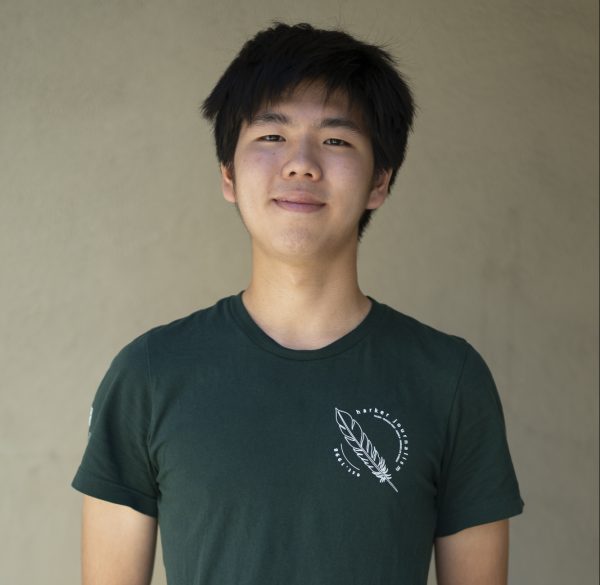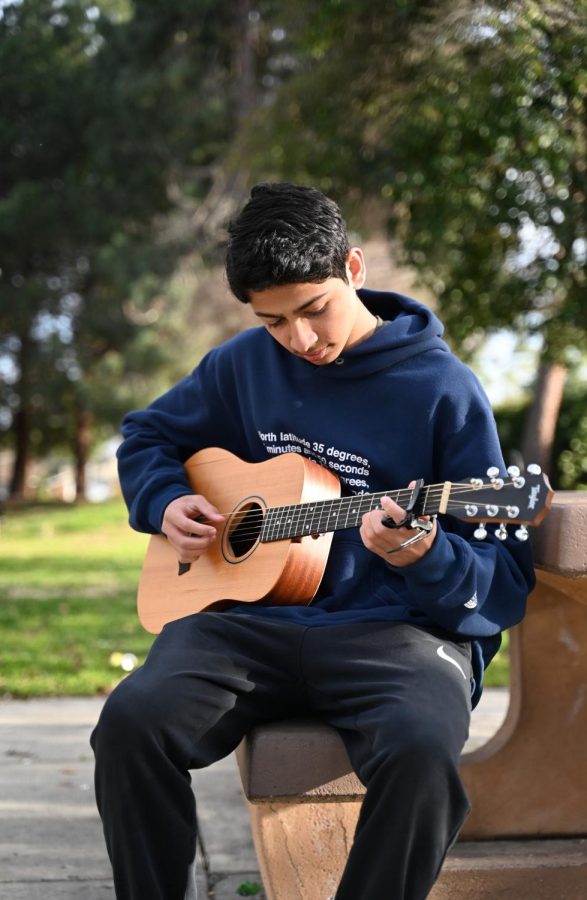Humans of Harker: In tune with the mind
Vikram Mani pursues guitar and neuroscience to contribute to the community
“Guitar tells you that you have to gauge your progress against not what you’re doing now, but what you tried to do in the past. If you feel like you haven’t improved at something, or if you feel like you’re not getting better at something, you have to gauge yourself against how you used to be and keep an open perspective. That also carries over to life in the sense that you can always check how much you’ve improved. Chances are, you have improved even if you’re not aware of it,” Vikram Mani (12) said.
Vikram Mani (12) recalls how the melody of a Frank Sinatra song “My Way” resonated in the atmosphere as he played his guitar, performing for his grandfather’s 80th birthday in front of nearly two hundred attendees who had gathered on this special evening occasion. Vikram had not often showcased his musical talent to a large public group prior to then, but that did not deter him from accepting this opportunity. As he precisely plucked at the guitar strings to form a chord progression while his uncle sang lyrics, a feeling of wonder pulsed through him: music was one of the few remaining powers that could reach and stimulate his grandfather at his age.
Playing his guitar for others has always been rewarding to Vikram, as he delights in the vicarious joy derived from his listeners. Motivated by this gratification, Vikram has attempted to learn common popular songs that can best resonate with his audience.
“A lot of what makes guitar worthwhile is being able to play a song well and then being able to play music for the people, but you can substitute yourself in for other people,” Vikram said. “If someone really likes a song, you can play it for them, and then they’ll be happy. And that’s a win, because people being happy is always a win.”
Guitar first piqued Vikram’s interest four years ago, particularly the realm of rock music. He aspired to recreate his favorite tunes with the help of digital guitar tabs, a form of music notation. Now, Vikram plays an electric guitar, optimal for heavy metal, and an acoustic guitar for other styles of songs.
“I wanted to be able to play the songs I listened to, and you can get fairly close to that,” Vikram said. “Being able to emulate the sound for me is really fun, especially when you’re doing that by yourself. The fact that I can take some song and emulate it on my guitar is a nice feeling, especially if it’s a difficult song.”
Vikram’s older sister Anika Mani (‘22) admires his relentless efforts to continue improving his guitar abilities. She noted his propensity to take advantage of any given opportunity to hone his guitar skills.
“He spends a lot of free time playing the guitar,” Anika said. “Every time before we would have dinner, he would go get his guitar and play. He says that it’s his way of taking a break from studying and just letting off some steam.”
Vikram invested many hours into guitar training lessons and individual practice before he could reach that state where he felt comfortable playing music openly. Through the continual process of practicing a new song, he also builds up his skillset, allowing him to pursue even more difficult songs in the future.
“The moment where you can play a song without looking at the tab at 80% speed, you feel so great,” Vikram said. “You still aren’t 100% of the way there, but that allows you to continue working on your own. Being able to play a song without having to look at the sheet music and getting it mostly up to speed is the first major step to being able to perform it in front of someone else. Just getting that done feels super rewarding. You know you’re making progress.”
Apart from playing the guitar, Vikram also shares his love for music with his friends. Rahul Herrero (12), a friend of Vikram since sixth grade, first met him through their shared hobby of soccer and soon discovered music as another common interest. Rahul recalls the day when Vikram suggested a few songs to him from a metal band, a pivotal moment that introduced Rahul to the world of rock music, shaping his music taste ever since.
“I was kind of skeptical, but then I listened to the song Vikram recommended and it immediately became one of my favorite songs of all time, and it still is to this day,” Rahul said. “I remember the glee on my face and [Vikram] really loving that I loved it, because it was a shared passion.”
Besides impacting others through his musical expression, Vikram hopes to better society on a larger scale through contributing to the field of neuroscience. Curious about how the brain works and the nature of consciousness, he studies psychology in school and also conducts neuroscience research on the behavior of maturing fish.
“I really want to understand how people think,” Vikram said. “There’s a lot I think I can contribute to the study of the brain, because we don’t know much about it. There’s a ton of unanswered questions when it comes to the brain, like what is consciousness? Could we grow a bunch of neurons in the shape of a human brain and get consciousness? That seems like a really interesting question and something I really want to solve.”
Upper school physics and science research teacher Chris Spenner taught Vikram and assisted him with a neuroscience research project in his sophomore year. During this Advanced Research course, Spenner recognized his ardor and eagerness to actively participate in classes despite being online. Now Spenner teaches Vikram in physics and continues to observe Vikram’s innate, contagious enthusiasm for science.
“For whatever Vikram is doing, he puts a lot of energy into it, and that energy is infectious,” Spenner said. “He’s interested in what we’re doing, whatever it is, and he’s willing to look for that relevance to his own life. In class discussions, he’s not afraid to take a chance. If he makes a mistake, he can laugh it off. That invites other people to do the same thing, to take chances and participate more.”
Whether he is advancing his neuroscience research or enhancing his guitar skills, Vikram makes sure to reflect on his growth. When he finds himself discouraged by a seeming stagnation in progress toward a goal, this reflective mindset helps carry Vikram through setbacks and remain resilient.
“Guitar tells you that you have to gauge your progress against not what you’re doing now, but what you tried to do in the past,” Vikram said. “If you feel like you haven’t improved at something, or if you feel like you’re not getting better at something, you have to gauge yourself against how you used to be and keep an open perspective. That also carries over to life in the sense that you can always check how much you’ve improved. Chances are, you have improved even if you’re not aware of it.”

Kevin Zhang (12) is a co-managing editor for Harker Aquila, and this is his third year on staff. This year, Kevin hopes to expand the scope of sports content...
Tiffany Chang (12) is the editor-in-chief of Humans of Harker, and this is her fourth year on staff. She’s looking forward to telling the story of the...


















![“[Building nerf blasters] became this outlet of creativity for me that hasn't been matched by anything else. The process [of] making a build complete to your desire is such a painstakingly difficult process, but I've had to learn from [the skills needed from] soldering to proper painting. There's so many different options for everything, if you think about it, it exists. The best part is [that] if it doesn't exist, you can build it yourself," Ishaan Parate said.](https://harkeraquila.com/wp-content/uploads/2022/08/DSC_8149-900x604.jpg)




![“When I came into high school, I was ready to be a follower. But DECA was a game changer for me. It helped me overcome my fear of public speaking, and it's played such a major role in who I've become today. To be able to successfully lead a chapter of 150 students, an officer team and be one of the upperclassmen I once really admired is something I'm [really] proud of,” Anvitha Tummala ('21) said.](https://harkeraquila.com/wp-content/uploads/2021/07/Screen-Shot-2021-07-25-at-9.50.05-AM-900x594.png)







![“I think getting up in the morning and having a sense of purpose [is exciting]. I think without a certain amount of drive, life is kind of obsolete and mundane, and I think having that every single day is what makes each day unique and kind of makes life exciting,” Neymika Jain (12) said.](https://harkeraquila.com/wp-content/uploads/2017/06/Screen-Shot-2017-06-03-at-4.54.16-PM.png)








![“My slogan is ‘slow feet, don’t eat, and I’m hungry.’ You need to run fast to get where you are–you aren't going to get those championships if you aren't fast,” Angel Cervantes (12) said. “I want to do well in school on my tests and in track and win championships for my team. I live by that, [and] I can do that anywhere: in the classroom or on the field.”](https://harkeraquila.com/wp-content/uploads/2018/06/DSC5146-900x601.jpg)
![“[Volleyball has] taught me how to fall correctly, and another thing it taught is that you don’t have to be the best at something to be good at it. If you just hit the ball in a smart way, then it still scores points and you’re good at it. You could be a background player and still make a much bigger impact on the team than you would think,” Anya Gert (’20) said.](https://harkeraquila.com/wp-content/uploads/2020/06/AnnaGert_JinTuan_HoHPhotoEdited-600x900.jpeg)

![“I'm not nearly there yet, but [my confidence has] definitely been getting better since I was pretty shy and timid coming into Harker my freshman year. I know that there's a lot of people that are really confident in what they do, and I really admire them. Everyone's so driven and that has really pushed me to kind of try to find my own place in high school and be more confident,” Alyssa Huang (’20) said.](https://harkeraquila.com/wp-content/uploads/2020/06/AlyssaHuang_EmilyChen_HoHPhoto-900x749.jpeg)



